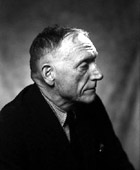Warren was born on a tobacco farm in Guthrie, Kentucky in 1905. He spent all of his childhood there listening to his grandfather’s tales of the civil war. His prosperous southern upbringing later influenced the depth and views of his writings. When he was fifteen a misaimed rock, thrown by his younger brother, hit him in the eye, causing him to lose site. Warren did not want to get his brother in trouble so he didn’t tell anyone about this incident until it was too late to for the eye to be cured. Warren lost all site in that eye. Being maimed in a certain way therefore made Warren decide not to go into a Naval career as he planned, but decided instead to go to Vanderbilt University for engineering. Little did he know he had other plans. When he got to Vanderbilt he was asked to join The Fugitives, a group of writers who were all of southern background and opposed the northern changes, therefore writing about it in the presses. His college roommate, Allen Tate who also was an aspiring writer, inspired him, under the direction or John Crowe Ransom, to write. Warren found this as a good way to express his feelings about being maimed and feeling different from others, his southern lifestyle, the lives of politics, and the tales he had heard of the Civil War.
Named “the first Poet Laureate of the United States (Gale-Net.com)”, Robert Penn Warren shows his true southern colors through his writing. After his third novel, All The King’s Men, a novel thinly disguising it’s modeling after the Louisiana politician the “Kingfish”, was published in 1946, it won the Pulitzer Prize in 1947. In 1957 he published a collection of poems called Promises: Poems which won the Sidney Hillman Award, the Edna St. Vincent Millay Memorial Award, the National Book Award, and the Pulitzer Prize. Warren won his third Pulitzer Prize for his work in Now and Then: Poems (1978), during the time he was a Chancellor of The Academy of American Poets (1972-1988). Robert Penn Warren died from cancer on September 15, 1989.
Biography by Camryn Ripley |






